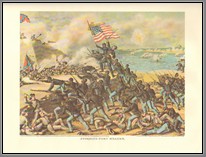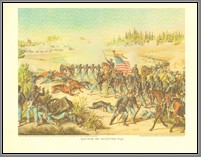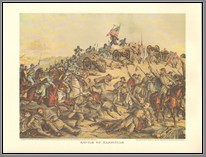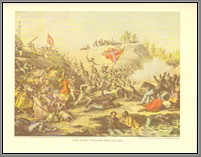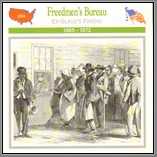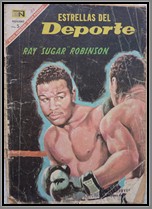Civil Rights/Slavery
 CA 2121983 menu autographed by Senator Strom Thurmond and his wife, given to Elaine Whitelaw, who was the chief fundraiser for the March of Dimes. B
CA 2121983 menu autographed by Senator Strom Thurmond and his wife, given to Elaine Whitelaw, who was the chief fundraiser for the March of Dimes. B
Price: $90.00
Note: James Strom Thurmond Sr. (December 5, 1902 – June 26, 2003) was an American military officer, attorney, judge and politician who served for 48 years as a United States Senator from South Carolina. He ran for president in 1948 as the Dixiecrat candidate on a states' rights platform supporting racial segregation. Thurmond represented South Carolina in the United States Senate from 1954 until 2003, at first as a Southern Democrat and then, from 1964 onwards, as a Republican.
A magnet for controversy during his nearly half-century Senate career, Thurmond switched parties in 1964, primarily because of his vehement opposition to the Civil Rights Act of 1964, and endorsed Republican presidential candidate Barry Goldwater. In the months before switching, he had "been critical of the Democratic Administration for ... enactment of the Civil Rights Law", while Goldwater "boasted of his opposition to the Civil Rights Act, and made it part of his platform."
In opposition to the Civil Rights Act of 1957, he conducted the longest speaking filibuster ever by a lone senator, at 24 hours and 18 minutes in length. In the 1960s, he opposed the civil rights legislation of 1964 and 1965 to end segregation and enforce the constitutional rights of African-American citizens, including basic suffrage. Despite being a pro-segregation Dixiecrat, he insisted he was not a racist, but was opposed to excessive federal authority, which he attributed to Communist agitators.
Starting in the 1970s, he moderated his position on race, but continued to defend his early segregationist campaigns on the basis of states' rights in the context of Southern society at the time. He never fully renounced his earlier positions.
Six months after Thurmond died, his mixed-race daughter Essie Mae Washington-Williams (1925–2013) revealed he was her father. Her mother Carrie Butler (1909–1948) had been working as his family's maid, and was either 15 or 16 years old when 22-year-old Thurmond impregnated her in early 1925. Although Thurmond never publicly acknowledged Essie Mae Washington, he paid for her education at a historically black college and passed other money to her for some time. She said she kept silent out of respect for her father and denied the two had agreed she would not reveal her connection to Thurmond. His children by his marriage eventually acknowledged her. Her name has since been added as one of his children to his memorial at the state capitol.
Fact card produced in 1993 by Atlas Editions about the Freedmen’s Bureau. Headed by Major General Oliver O. Howard (after which Howard University was named), the Bureau became the only guardian of civil rights the former slaves could turn to. However, “the agency became the pawn of the corrupt Radical Republican government and was used to maintain control of the states occupied by federal troops”. Congress discontinued the Freedmen’s Bureau in 1872. Text on reverse. B
Price: $30.00
Fact card produced in 1993 by Atlas Editions about Robert Smalls, the slave who became a politician. In 1862 Smalls, a slave, was piloting the Planter, a steam-powered side-wheeler that had been chartered to the Confederate government. He, along with his wife and two children and 12 other slaves managed to escape aboard the Planter and reached the Union blockade fleet off Charleston. Along with 4 cannon, Smalls brought vital intelligence about the Confederate defenses. Smalls was made civilian captain of the Planter and participated in 17 engagements. After the war he served in the South Carolina House of Representatives and five terms in the US House of Representatives. Text on reverse. B
Price: $30.00
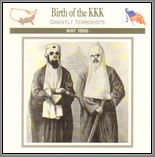 CA 207Fact card produced in 1993 by Atlas Editions about the birth of the KKK. The war brought economic ruin and a complete change to the social structure in the south. The Radical Republican Congress had placed the South under military rule and carpetbaggers and scalawags sat in the State houses, raising taxes and looting state treasuries. White Southerners had lost all control over their own affairs and as ex-Confederate General Nathan Bedford Forrest put it, in losing the war they had “lost all but (their) honor”, and now they felt even that was being stripped from them. To regain some measure of control, secret societies were formed and in 1866 a group of six ex-Confederate veterans formed the Ku Klux Klan. Thus began the “invisible empire of the South” that would grow to be the largest and best known of the groups that opposed the Reconstruction government and attempts by freed blacks to receive their rights. Klansmen wore white hoods as “ghosts of dead Rebel soldiers” and paid midnight visits to frightened blacks and carpetbaggers. Disgusted at how the KKK had become so violent, General Forrest resigned as the first Grand Wizard. Text on reverse. BB
CA 207Fact card produced in 1993 by Atlas Editions about the birth of the KKK. The war brought economic ruin and a complete change to the social structure in the south. The Radical Republican Congress had placed the South under military rule and carpetbaggers and scalawags sat in the State houses, raising taxes and looting state treasuries. White Southerners had lost all control over their own affairs and as ex-Confederate General Nathan Bedford Forrest put it, in losing the war they had “lost all but (their) honor”, and now they felt even that was being stripped from them. To regain some measure of control, secret societies were formed and in 1866 a group of six ex-Confederate veterans formed the Ku Klux Klan. Thus began the “invisible empire of the South” that would grow to be the largest and best known of the groups that opposed the Reconstruction government and attempts by freed blacks to receive their rights. Klansmen wore white hoods as “ghosts of dead Rebel soldiers” and paid midnight visits to frightened blacks and carpetbaggers. Disgusted at how the KKK had become so violent, General Forrest resigned as the first Grand Wizard. Text on reverse. BB
Price: $30.00
Fact card produced in 1993 by Atlas Editions about the origin and performance of the 54th Massachusetts Regiment. Worth noting is that black soldiers were paid $7 per month while white soldiers were paid $10. At least 134,111 slaves became Union soldiers during the war. Text on reverse. BBBB
Price: $30.00









